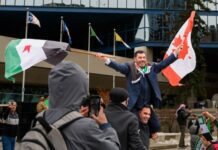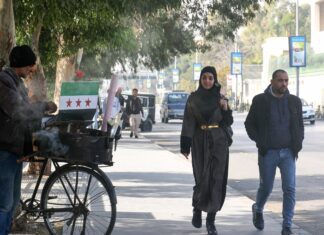An Interview with Lead Sanctions Analyst Vittorio Maresca
 Vittorio Maresca, a researcher and analyst specializing in political economy, holds an MSc in Economic History from the University of Oxford and is currently the Lead Sanctions Analyst for Karam Shaar Advisory. In this exclusive L24 interview, Maresca unpacks the possible impacts of President Trump’s historic lifting of US sanctions on Syria.
Vittorio Maresca, a researcher and analyst specializing in political economy, holds an MSc in Economic History from the University of Oxford and is currently the Lead Sanctions Analyst for Karam Shaar Advisory. In this exclusive L24 interview, Maresca unpacks the possible impacts of President Trump’s historic lifting of US sanctions on Syria.
Offering deep insight into what this policy shift could mean for Syria’s financial future, from the volatility of its currency to the challenges of rebuilding legitimacy in global finance. Maresca discusses the strategic weight of infrastructure projects, how Syria might use new diplomatic ties to attract capital, and the long road to escaping the FATF gray list. Maresca navigates the intersection of geopolitics, sanctions, and Syria’s post-conflict economy.
_______________________________
L24: What immediate effects do you anticipate on Syrian financial institutions and cross-border transactions following President Trump’s lifting of US sanctions on Syria?
Vittorio Maresca: “I think we need to first impact what Trump’s declaration could mean and what he means by ‘cessation.’ Of course, this is a pretty major breakthrough coming from the president himself, but we need to figure out what he means by cessation because we don’t yet know the scope. And … there are several layers concerning that.
“Then there’s also a whole other level of concerns, which has to do with counter-terror sanctions. So, it’s unclear whether Trump means ‘cessation’ only with respect to the first layer of US sanctions or also with respect to the counter-terror sanctions themselves. It’s also unclear whether this cessation is completely lifting or is rather a suspension.

“I suspect it to be more of a suspension and perhaps being time-bound or tied to some publicly outlined markers. And regarding the effects, I mean, we’ve already seen the effect overnight on the Syrian exchange rate. We’ve seen it plummeting from 25 percent reaching 8,000 value.
“So the effect will be tangible pertaining to a series of variables. But regarding, let’s say, capital inflows or the restoration of ties with the banking sector, it’s unclear. This is definitely a very positive signal, but there’s a whole other level of concerns that will need to be tackled, mainly still the over-compliance and de-risking from foreign financial institutions that persist in spite of the sanctions. So, this is something to be monitored.”
L24: How influential are Latakia’s port expansion and the Ugarit 2 Fiber Project in reshaping Syria’s economic and strategic future?
Vittorio Maresca: “Well, I’m not sure I’m in the best position to reply with respect to the Ugarit-led project itself. But regarding CMA CGM, we know that CMA CGM is a global giant and it has a presence in Lebanon.
“It controls the Tarablus port. It controls the Beirut port. And Rodolphe Sade, who’s the owner of the company, has profound ties with Macron, who has recently hosted Ahmad al-Sharaa in Paris.
“He said he’ll be investing another $260 million over the course of the partnership. So, this means money for jobs and new infrastructure in Syria. Perhaps the interest of the company itself and its decision to invest money will not stop only at the port.

“For instance, we’ve seen in Lebanon last year CMA CGM attempted to bid for the postal sector and tried to acquire Liban Post, trying to create a greater supply chain, perhaps connecting the port of Beirut and the port of Tripoli to the postal system of Lebanon and creating thereby a series of cost advantages for the company. I think this type of scenario where the company extends to a broader reach of services, even within Syria, is possible.
“What this means for Syria is definitely more money coming into the country, but it depends how this money will be distributed, whether it will go into the hands of newly created cronies or whether it will be well distributed through proper mechanisms of public procurement and other administrative mechanisms. So definitely a great opportunity, but it presents a series of problems regarding how these investments will take place.”
L24: How can Syria leverage recent dramatic outreach and gold investment forums to attract capital expertise and legitimacy for reconstruction?
Vittorio Maresca: “I think Syria can definitely capitalize on restored diplomatic ties with the Gulf states, particularly Qatar, Saudi Arabia, and to a lesser extent, the UAE. It could do so by positioning the country as ‘open for business’ in a series of post-conflict sectors like energy, but also logistics or in general infrastructure.
“I think an important part of that is to engage visibly, and at a high level, in Gulf-organized economic summits. So it could be, off the top of my head, the Future Investment Initiative or the Abu Dhabi Sustainability Week, by engaging in such events, it would pitch the country by framing it as reconstruction.
“It could present a reconstruction roadmap with a series of sectoral opportunities, but also reform commitments. I think it’s important for the country to utilize a series of business networks, whether they be Saudi or Qatari, or Omani, as gateways to broader MENA and also Asian capital pools. It’s definitely important the way it frames the Syrian recovery.
“So it should frame it as a regional public good and emphasize the spillover benefits for neighboring markets and, in general, for the Gulf’s own security and migration, but also cap-to-gun control concerns.”
L24: With US sanctions lifted, what steps must Syria take to exit the FATF gray list and restore financial credibility?
Vittorio Maresca: “At Karam, we’ve worked on the FATF (Financial Action Task Force) recently because it’s a very important issue. Sometimes people tend to think that just by easing sanctions, the country will attract new capital inflows from Western private sector agents. But that’s unlikely to happen precisely because of the ‘reputational concerns’ that still exist for investors by investing in the country.
“I think the FATF gray list is a good example of how such reputational concerns will persist. The steps Syria could take to get off the gray list are numerous. I think an important and achievable step would be for the Central Bank of Syria (CBS) to push the 15 local banks that exist there, Syrian local banks that currently operate in Syria, to adopt a series of internationally recognized AML (anti-money laundering) and CFT (counter-financing of terrorism) standards.

“A useful tool to begin with would be the Wolfsburg principles, which are a series of AML and CFT principles used by the biggest European and American banks. These are achievable targets for Syrian banks to get on track with international standards. That’s definitely something crucial.
“Progressing from there, it’s crucial for the new interim government and for the CBS to re-engage with FATF bodies, starting from MENAFATF, the regional FATF body that concerns the Middle East, and establish proper routes and channels for communication.
Lastly, it’s important for the FATF, which postponed a 2014 visit to Syria, to reassess the legal environment, and this visit has not happened yet. It’s important to show openness towards a FATF visit through its regional bodies. So, these are practical steps that a CETA (Comprehensive Economic and Trade Agreement) could take. Removal from the gray list would probably take at least one year.”
L24: Do you have insights given recent developments and the lifting of sanctions?
Vittorio Maresca: “What’s important to mention is that there are a series of sanctions that executive authority can remove. For instance, the FTO (Foreign Terrorist Organization) or the SDGT (Specially Designated Global Terror) designations, and executive orders targeting a series of financial transactions. Like the service ban that was pushed by the Obama administration. These are all measures that the executive authority can remove.
“However, there’s a whole series of other measures. So, for instance, the Caesar Act, but also the State Sponsorship of Terror list, and the Syria Accountability Act. These are all acts that were passed by Congress. So, for instance, Trump can work on suspending the Caesar Act every 180 days, yet the removal of the act itself will need to happen through a vote in Congress.
“The seats in Congress are in favor of Trump with a Republican majority, and also in general, Democrats show a certain willingness to remove sanctions on Syria. So, there are no expected hindrances regarding this process. Yet, it’s important to realize that the president alone cannot remove all of the sanctions.”








